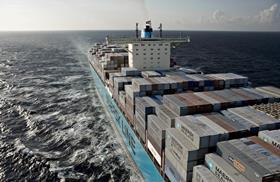
Maersk has joined forces with the World Business Council for Sustainable Development, Smart Freight Center and more than 25 global companies to formulate a guidance on the decarbonisation of logistics.
The aim of the collaboration is to co-develop an actionable and implementable guidance to quantify the impact of end-to-end greenhouse gas logistics emissions from supplier to final customer.
'Over the past year, we’ve seen a clearer picture emerge of the physical risks we’ll experience as our planet warms beyond 1.5 or 2 degrees,' the group explained. 'We have also seen greenhouse gas emissions reaching all-time highs alongside a proliferation of commitments to decarbonise and achieve net-zero.'
The company said that recognition and understanding were growing, when it came to government, business and public responsibilities for responding to climate change.
There was also a growing awareness of the need to have clear guidance across the value chain in both adapting to and mitigating climate change and creating science-based and transparent frameworks to accelerate the transition to sustainable logistics services, Maersk noted.
The initiative aims at increasing transparency on carbon emissions and work together towards a net-zero logistics.
'As a global provider of end-to-end logistics services across all transport modes, it is a strategic imperative for us to achieve net zero greenhouse gas emissions across the entire business by 2040,' said Morten Bo Christiansen, head of decarbonisation at AP Moller-Maersk.
'To ensure significant emissions reductions already in this decade, we have set clear and ambitious 2030 targets across our logistics operations,' he outlined. 'Having the right common standards for the whole logistics value chain in place is crucial to be able to reach our goals in time while seamlessly supporting our customers‘decarbonisation needs.
'Once fully developed, this guidance will be an accurate method to first, allocate emissions to our customers and secondly, guide us on what we should ask our vendors to report on.'
Supported by the World Economic Forum and built on analytical insights provided by McKinsey & Company, the guidance is meant to span across the entire supply, from supplier to customer.
The guidance will be published by the end of 2022, with an intended formal launch planned during the World Economic Forum Annual Meeting in Davos in January 2023.



